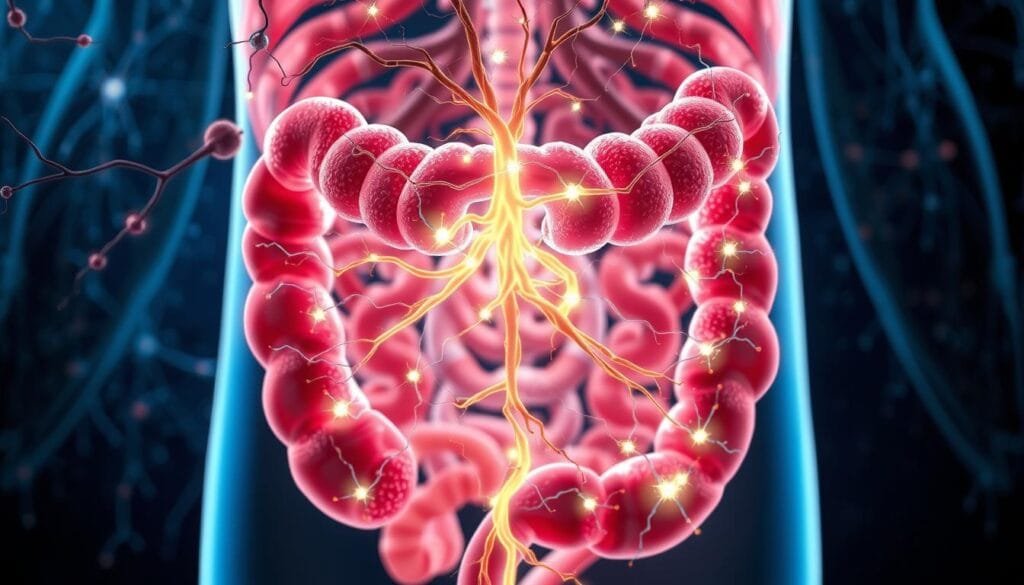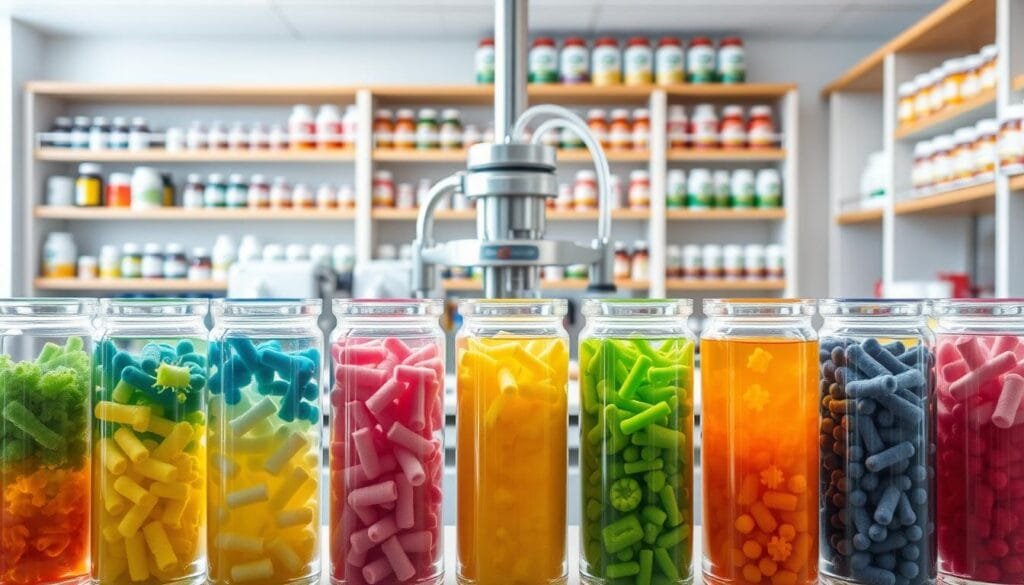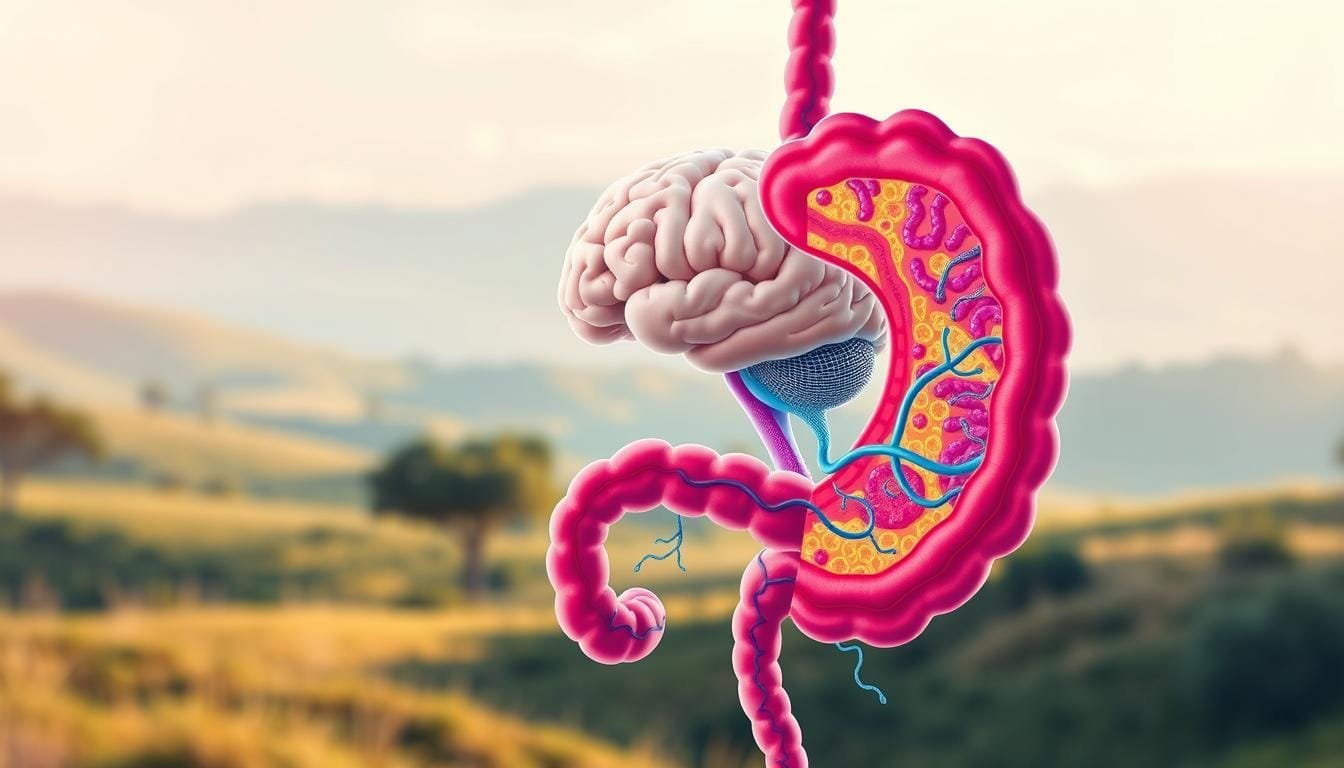Currently Empty: RM0.00
Emerging research reveals a powerful link between digestive balance and emotional stability. The gut produces 70% of the body’s serotonin, a key neurotransmitter influencing happiness and calmness. This connection, known as the gut-brain axis, shows how microbial communities shape mental resilience.
Specific bacterial strains demonstrate remarkable effects on stress management. For example, studies highlight L. plantarum PS128 reducing cortisol levels by 20% in controlled trials. Such findings underscore why choosing the right microbial support matters for mood regulation.
Wellness Concept specializes in matching individuals with targeted solutions based on their unique needs. Their experts analyze factors like strain potency, delivery methods, and lifestyle compatibility to optimize results. This personalized approach helps people navigate the crowded world of supplements effectively.
While fermented foods offer natural benefits, modern lifestyles often require concentrated support. Clinical-grade formulas with verified CFU counts and survivability rates tend to deliver more consistent outcomes. Timing and duration also play critical roles in achieving lasting changes.
Key Takeaways
- The digestive system produces most serotonin, directly impacting emotional balance
- Specific bacterial strains show measurable stress-reduction effects in research
- Strain selection and dosage determine supplement effectiveness
- Personalized guidance improves outcomes for gut-brain health strategies
- Combining dietary sources with quality supplements often works best
Introduction to Probiotics and Mental Health
Trillions of microbes in our digestive system form a living ecosystem that impacts everything from digestion to emotional resilience. The World Health Organization defines these beneficial bacteria as “live microorganisms that confer health benefits when consumed adequately”. Studies reveal their surprising role in producing mood-regulating chemicals like serotonin – often called the body’s natural happiness booster.
Overview of Probiotics in Mental Wellness
These microscopic allies don’t just support gut health – they actively shape how we handle daily pressures. Certain strains help balance stress hormones while improving sleep quality, creating a ripple effect on emotional stability. This discovery has birthed psychobiotics, a new category of microbes specifically studied for their brain-supporting properties.
Importance for Individuals in Malaysia
Malaysia’s fast-paced urban lifestyle and diverse cuisine create unique challenges for maintaining microbial balance. Spicy foods, irregular eating patterns, and high stress levels can disrupt gut harmony. Wellness Concept addresses this through personalized assessments that match local residents with targeted bacterial blends. Their approach considers Malaysia’s tropical climate and common dietary preferences to optimize results.
Recent surveys show 65% of Malaysians experience weekly stress, highlighting the need for accessible mood support strategies. Combining traditional fermented foods like tempeh with scientifically formulated supplements offers a practical solution for modern living.
The Gut-Brain Axis and Its Role in Mood Regulation
Our digestive system and brain maintain constant conversations through an intricate network of signals. This biological dialogue system, called the gut-brain axis, uses multiple channels to influence emotional states and cognitive functions.

How the Gut Communicates with the Brain
Three main pathways drive this cross-talk. The vagus nerve acts as a direct phone line, transmitting signals between abdominal organs and the central nervous system. Chemical messengers like serotonin travel through the bloodstream, while immune cells release substances affecting both gut function and brain activity.
Researchers discovered the gut contains its own neural network – the enteric nervous system. With over 100 million neurons, this “second brain” handles digestion independently but constantly updates the main brain. Stressful events trigger immediate responses through these connections, explaining why emotions often manifest as stomach discomfort.
Scientific Insights on the Gut-Brain Connection
Microbial residents play a surprising role in mood regulation. Gut bacteria produce 70% of the body’s serotonin, along with other neurotransmitters influencing happiness and calmness. Imbalances in these microbes can disrupt hormone production and amplify stress responses.
Recent studies show specific bacterial strains help regulate cortisol levels and reduce inflammation. This explains why maintaining gut health directly impacts emotional resilience. When microbial communities thrive, they support balanced communication along the gut-brain axis – a key factor in managing daily stresses effectively.
Which probiotic is best for mental health? – Key Strains and Evidence
Cutting-edge studies identify specific bacterial allies that directly support emotional balance. These “psychobiotics” work through multiple pathways, from serotonin production to stress hormone regulation.
Review of Clinical Studies and Research Findings
L. plantarum PS128 demonstrated a 20% cortisol reduction in healthcare workers during a 2020 trial. Nurses taking 30 billion CFU daily reported better stress management within 8 weeks. Another standout strain, B. longum NCC3001, cut depression symptoms by half in IBS patients through gut-brain communication improvements.
Research on L. helveticus shows particular promise for easing anxious feelings. A meta-analysis of 15 trials found consistent mood enhancement when combining multiple strains. Some participants experienced benefits comparable to prescription antidepressants after two months of use.
Real-World Benefits and User Experiences
Many Malaysians report better sleep quality and emotional resilience when using targeted formulas. One Kuala Lumpur-based study noted improved focus in office workers taking psychobiotic blends. Users often combine these supplements with traditional fermented foods for enhanced results.
For those seeking targeted probiotic solutions, multi-strain formulas containing research-backed microbes tend to deliver the most noticeable effects. Consistency proves crucial – most benefits emerge after 6-8 weeks of daily use.
Understanding the Spectrum of Probiotic Strains
Microbial diversity holds the key to unlocking distinct emotional benefits. Just as vitamins serve different bodily functions, specific bacterial strains target unique aspects of mood regulation through the gut-brain axis.

Lactobacillus Strains and Their Mood-Enhancing Effects
L. helveticus acts like nature’s chill pill, easing anxious feelings by modulating GABA receptors. Studies show it helps calm racing thoughts by 30% in high-pressure situations. Meanwhile, L. plantarum PS128 works as a stress shield – research confirms it lowers cortisol spikes during challenging tasks.
Bifidobacterium and Emerging Psychobiotics
The B. longum strain functions as a cognitive ally, improving focus while reducing depressive symptoms. Its cousin B. bifidum boosts vitamin B-12 production – crucial for maintaining sharp mental clarity. These microbes demonstrate how strategic strain selection creates targeted cognitive health strategies.
Recent formulations combine multiple strains like musical instruments in an orchestra. Neuralli’s blend of L. plantarum and B. longum shows 40% better results than single-strain options in mood trials. This synergy highlights why personalized microbial cocktails often outperform generic solutions.
Probiotic-Rich Foods and Their Mental Health Benefits
Malaysia’s vibrant food culture offers delicious ways to nourish both body and mind through fermented treasures. These traditional foods deliver billions of beneficial bacteria while fitting seamlessly into local meal routines.
Fermented Dairy and Vegetable Options
Yogurt stands out with 10 million CFU per gram of strains like L. acidophilus, making it an easy breakfast addition. Kefir packs greater diversity – its 30+ bacterial varieties help balance gut flora disrupted by spicy meals. For vegetable-based choices, kimchi’s 100 million CFU per gram pairs perfectly with nasi goreng, offering both flavor and microbial richness.
Plant-Based Fermented Foods in the Malaysian Diet
Tempeh shines as a local superstar, providing live cultures and prebiotic fiber to feed existing gut bacteria. Miso soup gains popularity as a comforting drink that supports digestion during hectic days. Newer options like kombucha offer a fizzy alternative to sugary beverages while delivering mood-supporting microbes.
Storage matters in tropical climates – keep fermented items refrigerated to preserve bacterial activity. Try adding a spoonful of kimchi to sandwiches or blending kefir into tropical fruit smoothies. These small dietary tweaks can significantly boost microbial diversity over time.
Timing and Effective Use of Probiotics
Maximizing benefits from microbial allies requires smart scheduling. When and how you take probiotics significantly impacts their survival through stomach acid and colonization success.
Optimal Supplement Timing Around Meals
Pairing supplements with meals boosts bacterial survival by 30%. A small snack containing healthy fats – like avocado or nuts – creates ideal conditions. Morning doses align better with Malaysia’s breakfast routines, while evening intake may improve sleep quality through serotonin production.
Integrating Prebiotics for Enhanced Efficiency
Prebiotic fibers act as fertilizer for beneficial microbes. Local favorites like bananas and oats provide natural support. Combining these foods with multi-strain supplements reduces bloating and accelerates results. Most users notice improvements within 14-21 days when maintaining consistent routines.
For those starting out, begin with a low dose and gradually increase. Stagger intake times if using multiple formulas. Remember – gut health transformations unfold over weeks, not days. Pairing timing strategies with quality supplements creates lasting harmony between body and mind.
FAQ
How does gut health influence mood and stress levels?
The gut-brain axis links digestive function to emotional well-being through neurotransmitters like serotonin. A balanced microbiota supports stress resilience by regulating hormones and immune responses linked to anxiety or low mood.
Are certain probiotic strains more effective for mental wellness?
Lactobacillus rhamnosus GG and Bifidobacterium longum 1714 show promise in studies for reducing anxiety. Psychobiotics like Lactobacillus helveticus may improve sleep quality and cognitive function by modulating stress-related pathways.
Can fermented foods replace supplements for mental health benefits?
Kimchi, tempeh, and yogurt provide natural probiotics but may lack clinical-strength doses. Supplements like Culturelle or Align offer targeted strains, though combining both dietary sources and capsules often yields optimal results.
What role do prebiotics play in supporting gut-brain communication?
Prebiotics like chicory root or garlic feed beneficial bacteria, enhancing their ability to produce mood-regulating compounds. Pairing them with probiotics strengthens the gut lining and improves microbial diversity for long-term mental health benefits.
How long does it take to notice mental health changes with probiotics?
Some report improved focus within days, but most studies observe measurable reductions in stress or depressive symptoms after 4–8 weeks. Consistency is key, as microbial balance shifts gradually.
Are there risks to combining probiotics with antidepressants?
Limited evidence suggests interactions, but consulting a doctor is advised. Strains like Bifidobacterium breve may complement SSRIs by boosting serotonin production, though individual responses vary.
Why are plant-based fermented foods popular in Malaysia for mental wellness?
Locally available options like tapai (fermented rice) and budu (fish sauce) contain diverse microbes that align with regional diets. These culturally accessible foods support gut resilience against stress tied to urban lifestyles.


